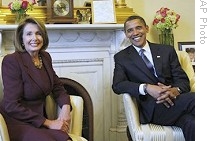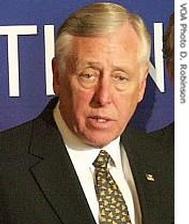VOA标准英语2009年-Obama Urges Lawmakers to Act Quickly on Economi(在线收听)
 |
| President-elect Barack Obama meets with House Speaker Nancy Pelosi in her office on Capitol Hill in Washington, 05 Jan 2009 |
Obama met individually with Democratic and Republican House and Senate leaders and later spoke to a bipartisan leadership gathering.
In comments to reporters early on Monday, he underscored the urgency of finalizing economic legislation.
"We have got an extraordinary economic challenge ahead of us," said Barack Obama. "We are expecting a sobering job[s] report at the end of the week. The Speaker [of the House of Representatives, Nancy Pelosi] and her staff have been extraordinarily helpful in working with our team so that we can shape an economic recovery and reinvestment plan that starts putting people back to work."
Mr. Obama wants tax cuts for individual Americans and businesses to make up a significant portion of expected legislation. This could involve as much as $300 billion of a bill that is likely to exceed $700 billion and include aid to cash-poor U.S. states, and money for alternative energy and a range of infrastructure projects.
Later, Mr. Obama said he expects to be able to sign legislation as soon as the end of this month, adding that quick action is necessary to "break the momentum of the U.S. recession".
Emerging later from bipartisan talks with Mr. Obama, House of Representatives Speaker Nancy Pelosi said lawmakers discussed with the president-elect how to pass a stimulus package as quickly as possible.
"An economic recovery package that will create jobs immediately and will grow the economy and that is what we talked about today," said Nancy Pelosi. "How we could do this expeditiously, deliberatively and to act upon it soon."
 |
| House Majority Leader Steny Hoyer |
Just how soon that would be, Pelosi would not say. But the Majority Leader Steny Hoyer has said a measure could move in the House by the end of this month, sending it to the Senate, with the objective of passage in mid-February.
How much support Democrats can obtain from Republicans will depend on the details. But the severity of the U.S. recession has created considerable bipartisan backing for quick action.
Senate Majority Leader, Harry Reid:
"There are investments that we need to make on behalf of the American people to turn around this economy," said Harry Reid. "I felt very good about the meeting; I am confident that we can do this and we have to do this."
Earlier, White House Press Secretary Dana Perino made this comment to reporters when asked about legislation shaping up on Capitol Hill.
"I think the best thing I can do is to decline to comment on what they are going to do going forward," said Dana Perino. "Obviously, we think that tax cuts were the right way to help our economy get out of the recession that this president inherited and we know that tax cuts can spur innovation."
Asked by reporters how large the economic stimulus package might be, Senate Majority Leader Reid said President-elect Obama indicated that all but one of some 28 economists advising him had said it should range from $800 billion to $1.3